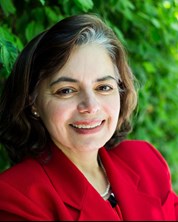- Learning
Renu Kulkarni in Conversation
Discussion, Experimentation and Data-Gathering at Chicago Booth Executive Education
Renu Kulkarni has been Associate Dean of Executive Education at Chicago Booth School of Business since March 2015, but describes herself as an ‘accidental academic’. She cut her teeth in the business world at a swathe of the leading US mobile telecom businesses, Verizon, Sprint, AT&T International and then leveraging her experience joined Deloitte Consulting in 1996, before a nine year stint at Motorola starting as a Director of Corporate Strategy in the CEO’s office and culminating as Vice President, Technology Partnerships for the US$60 billion multinational. Renu then accidentally entered academia when she was tapped by the Georgia Institute of Technology, upon a newly appointed university President, to establish a new research and economic development center focused on shaping the future of mobile, social and digital technologies.
Motorola is one of the great pioneer organizational learning companies, and so it is not surprising that Kulkarni now traces her first executive education experiences back to her time there, “now that I'm here [Chicago Booth], I realize that I actually went through an executive education program when I was at Motorola. It was called The Motorola Advanced Leadership Program. Three universities, nine months, three companies, we all went through it together. That was unusual.” It was not, of course, Kulkarni’s first encounter with high level academia, she had already successfully acquired her degree in Industrial Engineering with Management Science from Georgia Tech, and an MBA from Emory’s Goizueta School in the mid-1990’s, so business education was no stranger to her from the participant side, but she admires Chicago Booth for being bold enough to bring in someone who was not steeped in university experience to take the helm of its executive education side.

“They could have filled the associate dean role with a veteran of executive education from a peer school, which would have been a natural avenue. But they chose to go the route of an executive who's been in industry” reflects Kulkarni.
A bold decision was probably needed though as Kulkarni was following in the footsteps of Steve LaCivita, who had led the school’s – and indeed the sector’s – establishment and growth in executive education for the preceding couple of decades. As with any organization, when a strong and successful leader retires from their post after a long period in office, it provides an opportunity for change, with a new perspective and different energy. By bringing in Kulkarni with her corporate background, the school clearly was looking to enhance the opportunity for a new perspective and fresh direction.
|
She takes this Chicago Booth mission seriously, seeing that the school is a non-profit organization, though executive education is a profit-generating centre within that, but balancing the mission with the money is a constant concern. Unlike in her previous corporate roles she has more flexibility though, “I don’t have the charter to grow by 200% or 300%, which is odd, as a businessperson, to not have something like that”. There is awareness that Chicago Booth serves the talent development needs of senior executives. Kulkarni indicates that it is mostly C-level to four or so levels below that that tends to get drawn to our programs and this from the more substantial organizations. Though she is keen to highlight that the school does offer places to those who are unable to afford some open enrolment programs, “For example, we do custom programs with the Urban League [a US civil rights/advocacy organization]. We also offer scholarships, such as the Harry L. Davis Executive Education Scholarship for Non-Profit Leaders to reach emerging leaders in organizations that would otherwise be unable to attend our programs. That’s part of the model as well…” Chicago Booth is best known for its finance programs, being the birthplace of the Chicago school of economic thought – which eschewed Keynesianism for monetarism in the 1970s with famous faculty such as Milton Friedman and George Stigler, this morphed into neo-classical macroeconomics and research based upon ‘rational expectation’ under luminaries such as Ronald Coase and Eugene Fama in the 1980’s. In the 1990’s Gary Becker built on this with his work on the Labour Market, and this in turn led to Steven Levett’s popular exploration of economics in Freakonomics; all were, or are, economics faculty of Chicago Booth, and many have been awarded Nobel Prizes, in fact seven Nobel Prize winners are currently teaching at Booth. The challenge for the school is to ensure that with this stellar heritage in economics and finance that other disciplines get a chance to shine too. Kulkarni is not too concerned though. “We find the more senior you get, the more important the softer skills are. You already have the acumen in whatever domain, whether it’s finance or marketing or HR. We find that the more senior the more soft skills are required to become a better-rounded executive. We have quite a bit of success with offerings in leadership, strategy, marketing, negotiation/decision making, and organizational effectiveness The core focus on data from the economic and finance research does filter throughout the school though, and Kulkarni sees that as a great positive. “The notion of collecting and using data has been in our DNA for 125 years, and it leads to making robust decisions, discoveries and insights. That is very much still in play, and in fact, you can argue, it is part of the fad of big data and data for decisions. That’s something we have done all along, we have research centres, a marketing research centre, social sciences, computer science, and more. That’s a big piece, the social behavioural science. This has led to two new marketing programs, Digital Marketing for Executives, which shows how marketeers in any industry make better decisions using the data that they have access to, taught by two professors, Pradeep Chintagunta and Lil Mohan. Lil was at Motorola with me, and brings his industry experience from there, as well as Amazon, Intel, Infosys and two successful high-tech start-up companies: Junglee and Snapstick. The other new program is led by professor Jean-Pierre Dubé on Big Data and Marketing Analytics, again strongly based on data and its analysis.” |
ARTICLES YOU MIGHT LIKE
VIEWPOINT
For Thomas Misslin, transformation rather than training is the aim of executive education at emlyon business school
DEVELOPING LEADERS QUARTERLY MAGAZINE AND WEEKLY BRIEFING EMAILS

































